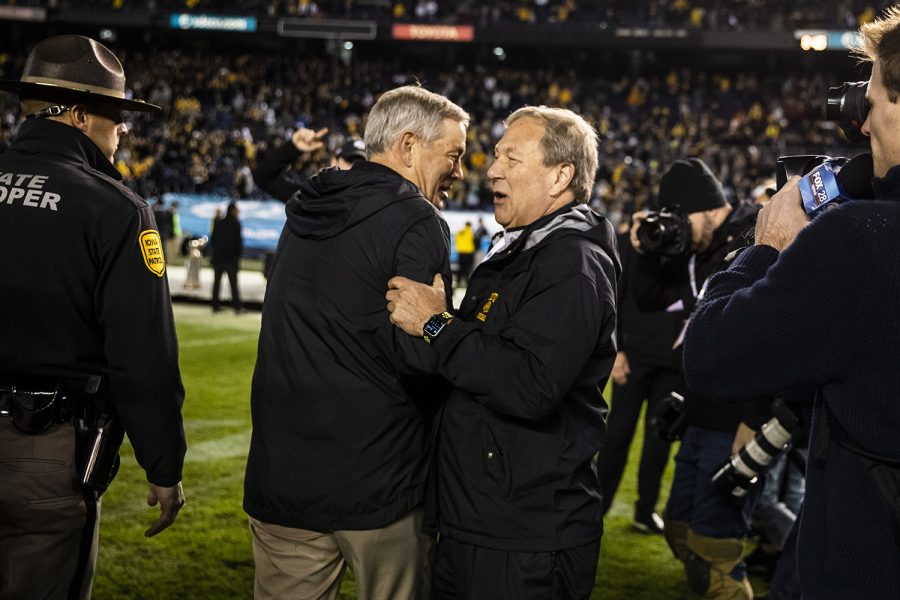Iowa set to resume sports practices June 1, University of Iowa president says
UI President Bruce Harreld told the state Board of Regents Thursday that June 1 is the target date to resume organized team activities.
Iowa head coach Kirk Ferentz greets UI President Bruce Harreld after the Holiday Bowl game between Iowa and USC at SDCCU Stadium on Friday, Dec. 27, 2019. The Hawkeyes defeated the Trojans, 49-24.
April 30, 2020
University of Iowa President Bruce Harreld told the state Board of Regents Thursday that the school was planning to resume athletic practices, including football practices, June 1.
“We have a moratorium on all team activities until June 1,” Harreld said. “We’re ever so hopeful that this virus will be behind us at that point and we’ll be able to get back to what we normally do.”
Sports have been on hold for the UI since March 13, when the Big Ten announced a suspension on all organized team activities because of the COVID-19 pandemic. The Big Ten had already canceled the 2020 Big Ten men’s basketball tournament earlier that day before announcing the cancellation of all conference and nonconference competitions through the end of the academic year, including spring sports that compete beyond the academic year, and participation in all NCAA tournaments and competitions.
Harreld said the timeline regarding fall sports could change as the state’s situation with the novel coronavirus continues to develop. Fall sports teams will need at least six to eight weeks of preparation before competition can begin, especially because these teams missed out on a majority of spring practices, Harreld said.
Iowa head football coach Kirk Ferentz and strength and conditioning coach Chris Doyle have previously said six weeks was likely the minimum time needed to safely prepare a team for the regular season under the current situation.
“I know you say, ‘What’s the difference between six and eight weeks?’, but here’s the difference,” Doyle said Wednesday. “In a six-week program, it’s [two] weeks of training. In an eight-week program, it’s four, it’s double. If we have four weeks to train guys before they step on a football field and engage in a football practice, it reduces the risk for our athletes.
“Everybody wants to get back. Getting people back on campus is a priority to us. Players are dying to get back, but we will make sure that we do it in a safe, gradual, progressive manner.”
Harreld said he met Thursday morning with Big Ten leaders to review issues facing the universities. As a number of Big Ten universities have academic medical systems, he said, they each put an expert into the Big Ten commission to examine safety issues facing athletics at large.
The university is prepared for a slight delay to the beginning of the football season and for a number of other scenarios that could develop.
As far as potentially playing games without fans if the coronavirus is still at a stage where it is not safe to gather in large groups, Harreld said would require a lot of testing on the individual players involved with the game. He said if that situation did come up, he would refer to medical experts.
Iowa Athletic Director Gary Barta previously said he’d also be open to playing football games without fans if it meant the games could be played.
“Everybody wants to get back to normal, whatever the new normal is,” Barta said April 9. “I know a lot of people would feel a little bit of healing will go on once we get back into Kinnick Stadium.”
Barta said that he, Harreld, and Ferentz meet regularly to discuss the safest way to approach returning to football.
“You’re going to have to figure out how are we going to make all this work moving forward from that point, so it’s a really complex equation,” Ferentz said April 15. “I think before you start burning too many brain cells on that, let’s just kind of let things play out a little bit longer here and see where it all goes.”



